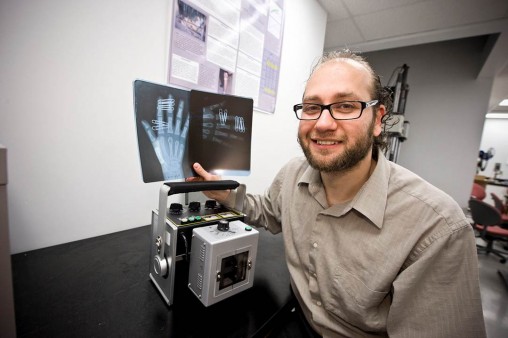
Assistant engineering professor Nasser Kashou with X-rays and the X-ray machines his students are taking to the African nation of Malawi.
With X-ray equipment in tow, five Wright State University engineering students will soon be getting exposure to medical care and foreign culture in the African nation of Malawi as part of a global health service-learning course.
Assistant engineering professor Nasser Kashou, Ph.D., is taking the undergraduate biomedical and mechanical engineering students to a small rural clinic in Malawi to deliver an X-ray machine and an incubator.
“The plan is to teach a handful of people there how to use the X-ray equipment—the safety issues, the technology,” Kashou said. “Each student will take a pair of locals and do one-on-one training.”
Malawi, in southern Africa bordering Tanzania, is one of the world’s least developed countries. With a largely rural population, its economy is largely based on agriculture, and the government depends heavily on outside aid. Malawi has a relatively low life expectancy and high infant mortality rate.
The students depart May 9, land in the Malawi capital of Lilongwe and drive north for a day before arriving at their destination, a tiny rural village.
“We’re really going to be out in the middle of nowhere,” said Kashou. “The residents are spread out, with homes a good distance away from each other. Electricity can be sporadic. They have well water there, but we have to treat it before we use it. There is not going to be bottled water.”
Kashou is teaching the students how to use the X-ray equipment, relying on information from a course used to certify X-ray technicians in Ohio. The students will in turn train the clinic workers how to use the X-ray machine and protective lead radiation vests as well as how to develop film manually. A small area in or near the clinic will be sealed off to create a darkroom, and a stand will be welded together to support the equipment.
“The main thing we’re going to try to focus on is safety radiation,” Kashou said. “Once it’s all set up, the X-ray equipment will be used to take chest X-rays and check for broken bones.”
The group will also deliver an incubator that runs off the power grid but has a backup battery that can be recharged using solar power.
Kashou intentionally selected undergrads for the trip because he wants them to see what the needs are in Malawi and then use their experience to design a senior class project in the global health program.
The students are Patrick Morrissey of Yellow Springs, Rachel Bruce of Tipp City, Katherine Gamber of Canton, Luke Stork of New Lebanon and Caitlin Hinds.
Some of the students are preparing for the trip by reading about African culture. Kashou is encouraging them to read, but says there is nothing better than the actual cultural experience.
“They’re learning the technical stuff here, and they’re going to learn it there. But that’s not really what’s going to keep them going long term,” said Kashou said. “Once you’re there and you see for yourself, you experience, then you know what reality is. There are some good things we can take from their culture.”
The trip involves six days of travel, with the group returning home May 25. In the end, clinic workers will have an X-ray machine and an incubator and be trained how to use them.
“This equipment will save lives; it’s a huge humanitarian project,” said Kashou. “And humanitarianism is a good quality for these students to have, especially if they are biomedical engineers.”


 Walking through open doors
Walking through open doors  Adventures await
Adventures await  Wright State to expand nursing facilities to meet workforce needs and prepare more graduates for in-demand careers
Wright State to expand nursing facilities to meet workforce needs and prepare more graduates for in-demand careers  Wright State student-athletes make a lasting impact on local family with more to come
Wright State student-athletes make a lasting impact on local family with more to come  Wright State names Rajneesh Suri dean of Raj Soin College of Business
Wright State names Rajneesh Suri dean of Raj Soin College of Business 